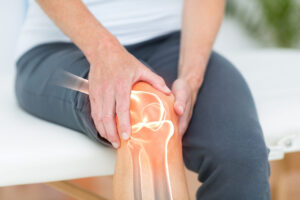
- What Is Psoriatic Arthritis in the Knee and What Does “Bone on Bone” Mean?
Psoriatic arthritis is an inflammatory form of arthritis that affects people with psoriasis. When it targets the knees, it causes pain, swelling, stiffness, and reduced mobility.
If not treated early, it can progress into a severe condition known as “bone on bone knee”—a degenerative stage where the protective cartilage is completely worn down, causing bones to grind against each other. This leads to:
- Intense, persistent pain (even at rest)
- Crunching or grinding noises during movement
- Significant loss of mobility
- Swelling and joint deformity
Many people think surgery is the only answer. But thanks to advancements in natural and holistic care, there are safe and effective options that can offer real relief.
- Early Warning Signs You Shouldn’t Ignore
Catching arthritis early can prevent serious joint damage. Watch out for:
- Persistent knee pain, even if mild
- Morning stiffness or stiffness after sitting
- Cracking or popping sounds
- Gradual loss of flexibility
- Visible swelling or warmth in the joint
If you recognize any of these symptoms, it’s time to consult a Specialist Psoriatic Knee Arthritis Without Surgery Near Me and start a non-invasive care plan.
- Natural Treatments for Bone on Bone Knee and Psoriatic Arthritis
Here’s a complete integrative approach that combines diet, movement, supplements, and therapy—backed by clinical research and expert advice.
3.1. Anti-Inflammatory Diet
What you eat matters. The right foods can reduce inflammation, support joint healing, and boost your overall health.
Eat more of:
- Omega-3 rich fish: salmon, sardines, tuna
- Colorful fruits & veggies: blueberries, kale, carrots, spinach
- Spices: turmeric (with black pepper), ginger
- Nuts & seeds: walnuts, chia seeds, flaxseeds
- Dark chocolate (70%+): rich in antioxidants
Avoid:
- Refined sugar
- Fried and processed foods
- Processed meats
- White flour and excess salt
This diet not only improves joint health, but also benefits your skin (especially for psoriasis), cardiovascular health, and weight—an important factor in knee arthritis.
3.2. Gentle & Targeted Exercise
Movement is medicine. Even with painful knees, you can stay active with low-impact exercises that strengthen and support your joints.
Recommended activities:
- Walking on grass or soft surfaces
- Water exercise: swimming or aqua aerobics
- Tai chi or gentle yoga
- Physical therapy tailored to your condition
Strength-building movements:
- Quadriceps and hamstring exercises
- Balance and coordination drills
- Daily stretching for flexibility
Working with a Knee Arthritis Treatment specialist can help you develop a safe and effective routine.
3.3. Supplements & Natural Remedies
Several natural compounds have been shown to ease joint pain and slow degeneration:
- Glucosamine and chondroitin: joint cartilage support
- Type II collagen: promotes elasticity and repair
- Boswellia serrata: powerful anti-inflammatory
- Curcumin (from turmeric): comparable to NSAIDs for pain relief
- Vitamin D and calcium: supports bone strength
- Omega-3s: from fish oil or plant-based sources
Always consult a healthcare provider before starting new supplements.
3.4. Complementary Therapies
These supportive therapies can help accelerate healing and reduce the need for medication:
Acupuncture:
- Improves local circulation
- Reduces inflammation and pain
- Helps decrease pain medication use
Mind-Body Techniques:
- Meditation: lowers stress-related inflammation
- Cognitive Behavioral Therapy (CBT): helps manage the emotional toll of chronic pain
- Therapeutic massage: relieves muscle tension and improves mobility
3.5. Better Sleep & Daily Habits
Quality sleep is essential for healing and inflammation control. Lack of rest worsens pain sensitivity and joint damage.
Sleep hygiene tips:
- Aim for 7–8 hours of restful sleep
- Avoid screens an hour before bed
- Limit caffeine
- Elevate your legs with a pillow if there’s swelling
3.6. Avoid These Common Triggers
Certain lifestyle factors worsen both bone on bone knee and psoriatic arthritis:
- Smoking: accelerates cartilage breakdown
- Heavy alcohol: increases inflammation
- Sedentary lifestyle: worsens stiffness and joint deterioration
- Self-medication: may mask symptoms or cause side effects
- Why Choose a Natural Treatment Approach?
Natural treatments for bone on bone knee offer several powerful advantages:
- Fewer side effects than surgery or medications
- Whole-body healing (mind + joint + immune system)
- Lower long-term healthcare costs
- Prevention of future joint damage
- You stay in control of your recovery
- How to Find the Right Help
If you’re searching for the Best Psoriatic Knee Arthritis Doctor Near Me or a Specialist Psoriatic Knee Arthritis Without Surgery Near Me, here’s how to start:
- Look for integrative medicine clinics near you
- Search for rheumatologists open to natural or non-invasive care
- Contact physical therapy centers with arthritis programs
- Ask about non-surgical care at holistic or wellness clinics
Conclusion: You Can Heal Naturally and Move Freely Again
Psoriatic arthritis and bone on bone knee don’t have to lead to surgery or a life of chronic pain. By following a natural, evidence-based treatment plan, you can regain strength, flexibility, and confidence—one step at a time.
Your healing begins today. Treat your knees with care, your body with respect, and your health with intention.
Want personalized help? Looking for the best local doctor or therapy plan near you? Message us now—we’re here to guide your next step toward pain-free movement.
